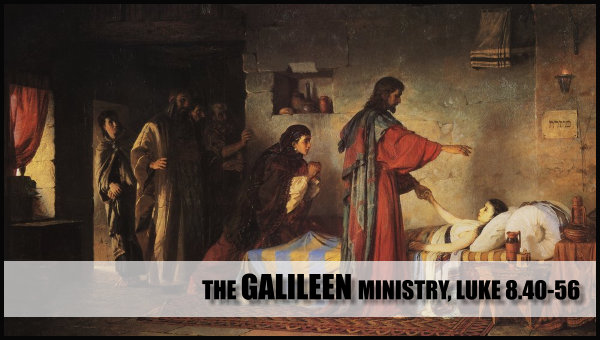By Tyson Thorne

The Galilean Ministry at Various Cities (4.14-9.50), 8.40-56
Following his encounter with the scary demoniac of the Gerasenes, Jesus and his band of disciples got back in the boat (which I’m sure is just where they wanted to be, considering the storm they narrowly escaped on the way over) and headed back to the town they left that morning. Apparently he had mentioned to someone that they were taking a day trip and would return that evening, as a large crowd was waiting for him upon his return. Among them was a man named Jarius, an elder at the local synagogue and the father of a very sick 12-year-old girl.
On the way to Jarius’ home the crowd traveled with him, which turns out to be as uncomfortable as it sounds. The multitudes were pressed together so tight that it was difficult to breathe. The Greek word used here for “pressed” was commonly used to describe the pressing of grapes and is used to portray the pressure of the crowd as well as the physical contact they made. Somehow in this vast throng a woman who sought healing was able to get close enough to Jesus to touch his out garment, specifically the blue tassel at the hem of his garment that symbolized obedience to the law and ritual purity. This is especially appropriate as her illness was one of bleeding, which made her ceremonially unclean.
While no one was able to heal this woman (verse 43) she was instantly healed the moment she touched Jesus’ cloak. Jesus knew about the healing event and asked “who touched me?” He did not ask because he did not know the answer, he asked so the woman would come forward and express her faith; she was to be an example before the people. The woman came forward and, falling at his feet, explained her audacity. Pleased, Jesus affirmed her. He called her “daughter” which, from the recent account about Jesus’ mother and brothers likely indicates she was more than a follower of Jesus, she believed him to be the Messiah and obeyed his teachings. “Your faith has healed you,” Jesus proclaimed, “Go in peace.”
While Jesus was speaking someone from Jarius’ home came with news of the girl’s passing. It should be noted that Jesus does not contradict the messenger. Even so, he instructs Jarius to “believe” she can yet be delivered. At his home the family was in shambles, weeping and mourning. Jesus told them to stop as the girl was merely asleep. The extended family’s reaction of laughing at Jesus’ statement reveals their unbelief. It is likely for this reason Jesus only allowed Jarius and his wife, and Peter, James and John into the room. When Jesus commanded the girl to sit up Luke tells us that the girls spirit returned to her, though he does not say from where. From other passages in this gospel we can discern that her spirit was in Paradise (Luke 16.19-31 and 23.43). He then instructed the parents to get the girl something to eat and to not tell anyone what had occurred (Jesus did not want miracles such as these to become the central theme of his ministry).
Over the last few passages we’ve witnessed Jesus exercise his authority over natural and spiritual forces, and here we witness his authority over disease and even death. All of this emphasizes the big idea of this gospel book: Jesus is the savior and rightful king of all peoples everywhere It also foreshadows what is yet to come. Just as Jesus has the authority to raise a girl from death to life, he himself would be resurrected.
|
|
